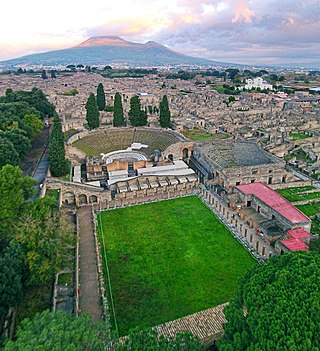Pompeii is a ruined Roman city near modern Naples in the Italian region of Campania.
Contents
- Places
- Arts, entertainment, and media
- Films
- Music
- Other uses in arts, entertainment, and media
- Other uses
- See also
Pompeii, Pompei may also refer to:
Pompeii is a ruined Roman city near modern Naples in the Italian region of Campania.
Pompeii, Pompei may also refer to:
Mystery, The Mystery, Mysteries or The Mysteries may refer to:
London is the capital city and largest metropolitan region of both England and the United Kingdom.
Immortality is the ability to live forever, or eternal life.
The Gift(s) may refer to:
An eclipse is an astronomical event.

Pink Floyd: Live at Pompeii is a 1972 concert film directed by Adrian Maben and featuring the English rock group Pink Floyd performing at the ancient Roman amphitheatre in Pompeii, Italy. The band performs a typical live set from the era, but there is no audience beyond the basic film crew. The main footage in and around the amphitheatre was filmed over four days in October 1971, using the band's regular touring equipment, including a mobile 8-track recorder from Paris. Additional footage filmed in a Paris television studio the following December was added for the original 1972 release. The film was then re-released in 1974 with additional studio material of the band working on The Dark Side of the Moon, and interviews at Abbey Road Studios.
Breath may refer to:
Wonderland may refer to:

"Run Like Hell" is a song by English progressive band Pink Floyd, written by David Gilmour and Roger Waters. It appears on the album The Wall. It was released as a single in 1980, reaching #15 in the Canadian singles chart and #18 in Sweden, but it only reached #53 in the U.S. A 12" single of "Run Like Hell," "Don't Leave Me Now" and "Another Brick in the Wall " peaked at #57 on the Disco Top 100 chart in the U.S. To date, it is the last original composition written by both Gilmour and Waters, the last of such under the Pink Floyd banner, and is the last composition ever recorded by all four members of the classic 70s-era Floyd lineup together, within their traditional instrumental roles of Waters on bass, Gilmour on guitars, Nick Mason on drums, and Richard Wright on keyboards, on the same song.
Skin is a soft outer covering of an animal, in particular a vertebrate.
"Set the Controls for the Heart of the Sun" is a song by the English rock band Pink Floyd, appearing on their second album, A Saucerful of Secrets (1968). It was written by Roger Waters, taking lyrics from a Chinese poetry book, and features a drum part by Nick Mason played with timpani mallets. It is the only song recorded by Pink Floyd to feature material from all five band members, as there are several different guitar parts recorded by both David Gilmour and Syd Barrett, although the guitar parts are buried in the mix.
A machine is a device that uses energy to perform some activity or task.
The Final Cut may refer to:
I is the ninth letter of the Latin alphabet.
The Dark Side of the Moon is a 1973 album by Pink Floyd.
The Sword in the Stone may refer to:

The ancient Roman city of Pompeii has been frequently featured in literature and popular culture since its modern rediscovery. Pompeii was buried under 4 to 6 m of volcanic ash and pumice in the eruption of Mount Vesuvius in AD 79.

Pompeii was an ancient city in what is now the comune (municipality) of Pompei, near Naples, in the Campania region of Italy. Along with Herculaneum, Stabiae, and many surrounding villas, the city was buried under 4 to 6 m of volcanic ash and pumice in the eruption of Mount Vesuvius in 79 AD.

The Amphitheatre of Pompeii is one of the oldest surviving Roman amphitheatres. It is located in the ancient city of Pompeii, near Naples, and was buried by the eruption of Mount Vesuvius in 79 AD, that also buried the city of Pompeii and the neighbouring town of Herculaneum. Six bodies were found during the excavations.

The Rattle That Lock Tour was a concert tour by English singer and musician David Gilmour to support his fourth solo studio album, Rattle That Lock. The tour became a commercial success, grossing $47 million and selling 288,997 tickets in 16 shows in the 2015 total. It was the 76th highest grossing of the year, according to Pollstar's annual year end tour chart. The tour covered 50 performances – 17 more than his On an Island Tour in 2006. The tour is documented on the live release Live at Pompeii (2017).